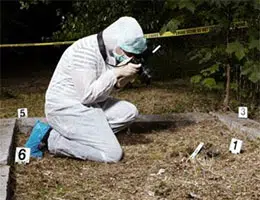 The etymology of criminalistics refers to the German word kriminalistik . The concept is used to refer to the discipline that consists of analyzing the evidence of a crime with the aim of determining as much data as possible about how the event occurred.
The etymology of criminalistics refers to the German word kriminalistik . The concept is used to refer to the discipline that consists of analyzing the evidence of a crime with the aim of determining as much data as possible about how the event occurred.
Criminalistics, therefore, provides information of interest to the authorities who have the function of administering justice . By pinning down the mechanics of the crime by studying multiple factors, it is often possible to discover who is responsible .
What criminology does is reconstruct what happened through objective evidence that must then be interpreted. Generally the aim is to find the clues left by the culprit, either on the victim or at the crime scene. Fingerprinting , hematology and forensic medicine are some of the specialties that are part of criminology.
Let's look at these three concepts in detail to better understand the scope of criminology. First of all, we have fingerprinting , a science that allows us to study, classify, archive and recover fingerprints found in the distal phalanges of human fingers, for generally investigative purposes and applied in almost the entire world for a long time.
Fingerprinting is a branch of lophoscopy , the science that focuses on the study of the designs of the skin surface of the areas dedicated to locomotion, the perception of touch and prehensile function, both in humans and the rest. of primates and some other mammals, such as the common squirrel.
 Returning to fingerprinting, it is one of the best-known specialties in criminology , even outside the professional and technical field, largely due to its representation in works of fiction of all kinds. With the arrival of computer systems that allow millions of fingerprints to be stored and compared automatically, the importance of this science increased as it began to offer more precise results and in much less time.
Returning to fingerprinting, it is one of the best-known specialties in criminology , even outside the professional and technical field, largely due to its representation in works of fiction of all kinds. With the arrival of computer systems that allow millions of fingerprints to be stored and compared automatically, the importance of this science increased as it began to offer more precise results and in much less time.
Hematology is a specialty of internal medicine dedicated to treating patients with blood diseases. The field of action of hematology also includes the diagnosis and study of blood, spleen, lymph nodes and bone marrow, both in sick and healthy people.
On the other hand is forensic medicine , the third pillar of criminology, since it is the medical branch that focuses all the scientific knowledge of medicine and biology to solve the problems posed by the Law. Throughout a judicial process, for example, forensic doctors play a fundamental role, since they help the courts and judges to determine the cause of each injury noticed in the victims, for which they must examine the corpses with a series of techniques specific to their profession.
Suppose that a man appears dead inside his home and the first hypothesis is that it was a murder, since the body has a hole in the forehead. Criminalistics experts go to the scene and begin to carry out their work: they look for fingerprints, analyze stains on the floor, collect different objects, etc. Thanks to the work of specialists, it is determined that the man died from a shot from a 9 millimeter caliber pistol, which he received in the dining room of his house. The killer, who left his fingerprints on a table, entered through the front door and then escaped through a window. With this information provided by criminalistics, the authorities can advance in the search for the culprit .
